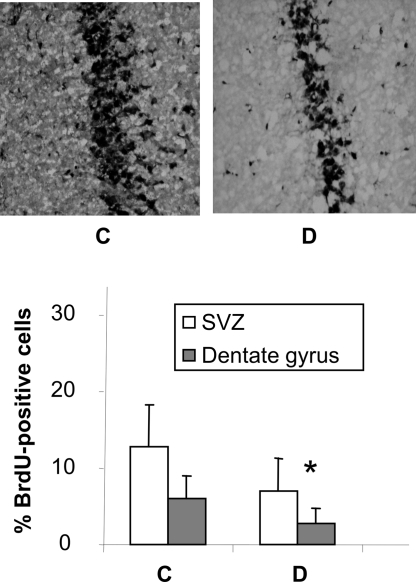The article by Troen et al. (1) adds interesting evidence that vitamin-B deficiency is associated with selective brain damage and cognitive decline. It reports a rarefaction of hippocampal microvasculature without neurodegeneration or gliosis in male C57BL6/J mice fed a B-vitamin-deficient diet. Cognitive impairment was shown by using a Morris water maze. According to the authors, this may result from the microvascular rarefaction. In a recent article (2) we showed that rat pups from dams fed a diet lacking methyl precursors (folate, vitamin B12, choline) during gestation and lactation accumulated homocysteine (direct measurement and immunohistochemistry), with decreased S-adenosylhomocysteine, in both neurons and astrocytes of selective brain structures, namely hippocampus, cerebellum, striatum, and the neurogenic subventricular zone. However, the influence of B-vitamin deficiency on neurodegeneration and neurogenesis is a matter of debate (3–5). In agreement with Troen et al. (1), we observed a 48% reduction of the thickness of the CA1 pyramidal layer (Fig. 1Upper) without noticeable gliosis in our developing rat model. Homocysteine-positive neurons expressed p53 and displayed fragmented DNA, indicative of apoptosis. In addition, further investigations showed that neurogenesis was only slightly affected in the dentate gyrus of deficient rats, but not in the subventricular zone (Fig. 1 Lower). Also, early vitamin B deprivation was associated with long-lasting functional disabilities of exploratory behavior (elevated plus maze) and learning and memory capacities (8-arm maze) at 80 days of age, long after switch to normal food. This suggests that vitamin B deprivation in early life may produce selective and persisting brain defects consistent with neurodegeneration.
Fig. 1.
(Upper) Thionin coloration of the CA1 hippocampus from control (C) and B-vitamin-deficient (D) rats at 21 days of age (40× magnification). (Lower) Percentage of BrdU-positive cells (after a single i.p. injection of 50 mg/kg) among total cells counterstained by DAPI in the subventricular zone (SVZ) and the hippocampal dentate gyrus. Data are reported as means ± SD (n = 7). C, control; D, deficient diet. *, P < 0.05 (statistically significant difference versus control, ANOVA, Fisher's test).
Acknowledgments.
This study has been supported by Institut National de la Santé et de la Recherche Médicale, the French National Agency for Research, and the region of Lorraine.
Footnotes
The authors declare no conflict of interest.
References
- 1.Troen AM, et al. B-vitamin deficiency causes hyperhomocysteinemia and vascular cognitive impairment in mice. Proc Natl Acad Sci USA. 2008;105:12474–12479. doi: 10.1073/pnas.0805350105. [DOI] [PMC free article] [PubMed] [Google Scholar]
- 2.Blaise SA, et al. Gestational vitamin B deficiency leads to homocysteine-associated brain apoptosis and alters neurobehavioral development in rats. Am J Pathol. 2007;170:667–679. doi: 10.2353/ajpath.2007.060339. [DOI] [PMC free article] [PubMed] [Google Scholar]
- 3.Kronenberg G, et al. Folate deficiency induces neurodegeneration and brain dysfunction in mice lacking uracil DNA glycosylase. J Neurosci. 2008;28:7219–7230. doi: 10.1523/JNEUROSCI.0940-08.2008. [DOI] [PMC free article] [PubMed] [Google Scholar]
- 4.Rabaneda LG, et al. Homocysteine inhibits proliferation of neuronal precursors in the mouse adult brain by impairing the basic fibroblast growth factor signaling cascade and reducing extracellular regulated kinase 1/2-dependent cyclin E expression. FASEB J. 2008;22:3823–3835. doi: 10.1096/fj.08-109306. [DOI] [PubMed] [Google Scholar]
- 5.Kruman II, Mouton PR, Emokpae R, Jr, Cutler RG, Mattson MP. Folate deficiency inhibits proliferation of adult hippocampal progenitors. Neuroreport. 2005;16:1055–1059. doi: 10.1097/00001756-200507130-00005. [DOI] [PubMed] [Google Scholar]



